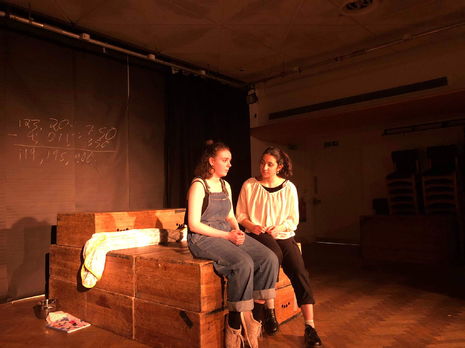Lemons Lemons Lemons Lemons Lemons: What if we were limited to a tweet’s worth of words a day?
Isobel Bickersteth is moved by this slick, delightfully understated production of Lemons

First performed as a student production in 2015, Sam Steiner’s Lemons Lemons Lemons Lemons Lemons has quickly reached cult status. Its premise is simple: a new law means communication is limited to 140 words a day, with the play exploring the impact of this upon couple Bernadette and Olive. It soon becomes apparent, however, that issues have long existed between the pair, leading to an engaging exploration of communication within relationships. Although this production gender-swapped Olive (Oliver in the original), this move seemed to have relatively little impact on the drama itself.
'Simplicity was at the core of this production, enabling Sara Hazemi and Emily Beck’s talent to shine through'
Simplicity was at the core of this production, enabling Sara Hazemi and Emily Beck’s talent to shine through. Both rose to the challenge of maintaining the intensity and focus required of a two-person show. Steiner’s script is episodic: flicking through temporalities to build an image of their relationship before and after the law was introduced. With this comes fast-paced changes in mood and tempo, sensitively conveyed by both actors.
Hazemi was particularly subtle at conveying shifts in tone, often within a single scene. Her Bernadette was engaging, captivating attention even as she mused on seemingly mundane topics. Beck’s Olive initially seemed rather serious, but by the end of the play, she had eroded her performance into a more complex consideration of character.

Space was used well. The play examines the gaps that are created by a lack of communication, and this was made visible by the characters’ movements across the stage. In one particularly noteworthy scene, we progress from the intimacy of the first ‘I love you’ to the repetition, and boredom, as this is repeated across occasions – until both remain on opposite sides of the stage.
This impactful simplicity is carried through into the set. All the action centres around a cluster of blocks and props are minimal, ensuring the attention is solely on Hazemi and Beck. The use of a chalkboard covered back wall was particularly effective; by the end of the play it's covered in numbers – a record of the increasing strain placed on the relationship - as Olive and Bernadette compare the number of words they have left. As the tallies grow, the divide in personalities becomes clearer, Bernadette’s regular, static number contrasting with Olive’s erraticism.
'A reminder that good theatre does not need to be overdone'
Zak Karimjee’s lighting added a subtle touch to the production. The post-law scenes are demarcated from those set before by harsh bright lighting, which felt like a visualisation of the new scrutiny under which they must conduct their relationship. His lighting choice must also be commended for its impact in the television announcement scene. Bernadette and Olive sit in torchlight, the audience shrouded in darkness, the fear and anticipation of their facial expressions greatly amplified.
It is clear that a great amount of care had gone into this production of Lemons Lemons Lemons Lemons Lemons. It was tightly executed, compact and well-thought-out – a reminder that good theatre does not need to be overdone.
 News / Caius mourns its tree-mendous loss23 December 2025
News / Caius mourns its tree-mendous loss23 December 2025 News / Clare Hall spent over £500k opposing busway 24 December 2025
News / Clare Hall spent over £500k opposing busway 24 December 2025 Comment / The ‘class’ of Cambridge24 December 2025
Comment / The ‘class’ of Cambridge24 December 2025 Comment / Yes, I’m brown – but I have more important things to say22 December 2025
Comment / Yes, I’m brown – but I have more important things to say22 December 2025 Interviews / Politics, your own way: Tilly Middlehurst on speaking out21 December 2025
Interviews / Politics, your own way: Tilly Middlehurst on speaking out21 December 2025








